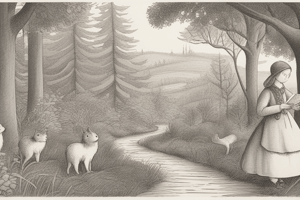Podcast
Questions and Answers
What is the primary focus of historical criticism as described?
What is the primary focus of historical criticism as described?
- Examining literary devices within the text
- Understanding the author’s social background and historical context (correct)
- Analyzing text as a self-contained unit
- Exploring the author's personal experiences only
In New Criticism, which aspect is primarily disregarded during the analysis of a literary work?
In New Criticism, which aspect is primarily disregarded during the analysis of a literary work?
- The author’s historical background and biography (correct)
- The internal symbolism and metaphor within the text
- The use of imagery and irony in the narrative
- The text's themes and characters
How might contemporary readers have interpreted Charles Dickens' A Tale of Two Cities differently than modern readers?
How might contemporary readers have interpreted Charles Dickens' A Tale of Two Cities differently than modern readers?
- They likely would not have recognized the social critiques embedded in the narrative.
- They would have had a better understanding of the novel's structural elements.
- They would have focused solely on the novel’s romantic elements.
- They would have related more closely to the political unrest depicted in the story. (correct)
Which question reflects a primary concern of New Criticism?
Which question reflects a primary concern of New Criticism?
What is a critical question related to the engagement of texts with dominant ideologies?
What is a critical question related to the engagement of texts with dominant ideologies?
What is a primary focus of Formalism in literary criticism?
What is a primary focus of Formalism in literary criticism?
Which of the following best describes an essential methodological aspect of Historical Criticism?
Which of the following best describes an essential methodological aspect of Historical Criticism?
How does Formalism view the concept of 'defamiliarization' in literature?
How does Formalism view the concept of 'defamiliarization' in literature?
Which critical question is primarily associated with Formalism?
Which critical question is primarily associated with Formalism?
Which aspect of Formalism emphasizes the work as an independent form of art?
Which aspect of Formalism emphasizes the work as an independent form of art?
Flashcards are hidden until you start studying
Study Notes
Formalism
- Focuses on the form and structure of the text, analyzing literary elements like plot, character, setting, imagery, and symbols.
- Emphasizes the intrinsic qualities of the text, such as language, structure, and literary devices, disregarding external influences like the author's life or historical context.
- Seeks to discover meaning by closely examining the inner workings of the text, focusing on how literary elements collaborate to create the overall impact.
Historical Criticism
- Analyzes the text within its historical context, understanding how events, social conditions, and cultural dynamics influenced the work.
- Views literature as a product of its time and place, seeking to understand how historical factors shaped the writer's ideas and the text's reception.
- Examines how the author's personal experiences and historical context played a role in creating and interpreting the work.
New Criticism
- An offshoot of Formalism, emphasizing close reading of the text as a self-contained unit.
- Disregards external contexts, focusing solely on the literary features present within the work.
- Strives to uncover the inherent meaning and complexity of the text by meticulously analyzing its formal elements, such as imagery, metaphor, and symbolism.
New Historicism
- This approach delves into the political aspects of literature, exploring how it reflects and shapes cultural structures.
- Seeks to uncover historical truths and authority embedded within the text, understanding the dominant ideas and assumptions of its time.
- Recognizes that history is not simply facts, but a complex reflection of human thought and reality, with literature serving as a window into this complexity.
Marxism
- Examines literature through the lens of class struggle, materialism, and economic power.
- Focuses on how power and economic structures influence the text and its representation of social relationships.
- Considers how literature reflects, reinforces, or challenges the ideologies of a given society.
Postcolonialism
- Examines literature produced in or about former colonies, focusing on the cultural legacies of colonization.
- Critiques the ways in which literature has been used to reinforce colonial ideologies and gives voice to marginalized perspectives.
- Investigates how literary works challenge or perpetuate power dynamics, stereotypes, and cultural consequences of colonization.
Postmodernism
- This movement emerged in architecture, rejecting modernist approaches and offering a skeptical interpretation of culture, art, history, and literature.
- Focuses on variety and challenges modernist principles of "totality," "unity," and comprehensiveness.
- Encourages the creation of art that transcends mere products, inviting individuals to engage fully with their existence and embody the art itself.
Studying That Suits You
Use AI to generate personalized quizzes and flashcards to suit your learning preferences.




